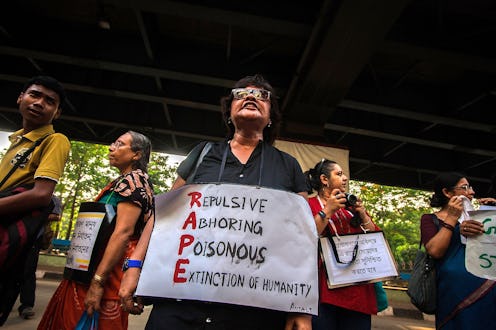Heading off to college is an exciting event, but for many people, that excitement is often tinged by the many college traditions that perpetuate rape culture. While worrying about being away from home for the first time and succeeding in their classes, many college students — women and gender-nonconforming people especially — often have to consider the very real possibility that they will be assaulted on campus. According to the Association of American Universities' Campus Crime Survey, 33.1 percent of women and 39.1 percent of transgender, genderqueer, questioning, or non-conforming people are sexually assaulted by their senior years. But it's not just these assaults themselves that are the problem — it's an overall environment of objectification and disregard for consent.
At its best, college can be a time when students learn to explore their sexualities in a sex-positive environment and experiment with different types of relationships. But the sexual freedom on college campuses can be a double-edged sword, because it can also be accompanied by a lack of regard for boundaries and a tacit approval of coercion. For this reason, sexual assault on college campuses has become known as an epidemic.
Here are some ways that colleges might perpetuate rape culture — and why they're so insidious.
1. Fraternity Culture
To be clear, the existence of fraternities does not itself perpetuate rape culture. I would know: In college, I lived in a co-ed literary fraternity house largely occupied by LGBTQ and polyamorous people who frequently discussed consent and boundaries. Plus, Greek life can offer solidarity and support to people with marginalized racial identities.
However, some traditional fraternities have been known to encourage behavior on the part of their members that borders on sexual coercion. The social chair of one Georgia Tech fraternity (which was ultimately disbanded for a "pattern of sexual violence") even allegedly sent out an instructional email titled "Luring Your Rapebait" to members in 2013. He later apologized and claimed it was a joke, but even if it was, the joke exists because it encompasses what many frats are known for. One viral video allegedly shows members of a Yale fraternity shouting "No means yes, yes means anal!" (The fraternity's president apologized for the incident, calling it “a serious lapse in judgment by the fraternity and in very poor taste.”) Because fraternities are often hallowed traditions at universities, administrations are often reluctant to punish them, leaving their victims vulnerable.
2. Drinking Culture
Like fraternities, college parties involving binge drinking don't inherently contribute to rape culture. They wouldn't if drinking were not considered an excuse to assault someone. However, college parties are often advertised as a way to take advantage of drunk students by having sex with them when they can't consent due to alcohol or date rape drugs. At least half of college sexual assaults involve drinking on the part of the victim or the perpetrator, according to a study from Wayne State University. It's not that victims are causing themselves to be assaulted by drinking, but due to inadequate understandings of consent, people may believe they are entitled to assault someone because the victim is drunk or they themselves are.
3. "No Means No" Consent Education
It might seem ironic for consent education to perpetuate rape culture, but it can when the wrong kind of consent is taught. Based on college students' beliefs about consent, they're not getting the kind of "yes means yes" education necessary to avoid all forms of sexual misconduct. 47 percent of college students in a Washington Post survey, for example, believe that someone is consenting to sex just by taking off their clothes. When we simply teach "no means no," we fail to clarify that only an enthusiastic "yes" constitutes consent — and that a "yes" can become a "no" at any point, which must necessarily result in the activity ceasing immediately.
4. Valorization Of Student Athletics
While sports can be a great way to build community and teach students important skills, there's a culture surrounding them that can foster entitlement on the part of athletes, encourage displays of toxic masculinity, and perpetuate that good old drinking culture. One National Bureau of Economic Research study showed that there's an increase in campus rapes on college football game days.
Images: Giphy(3)
